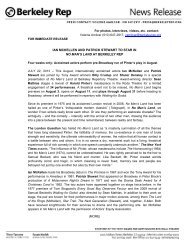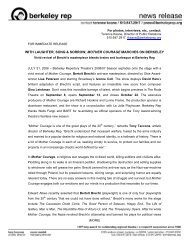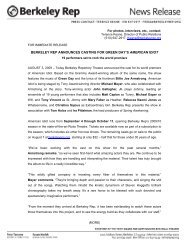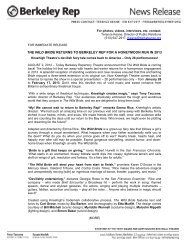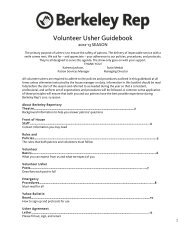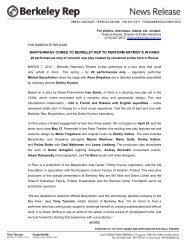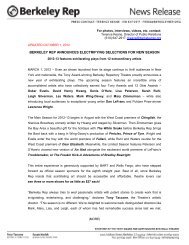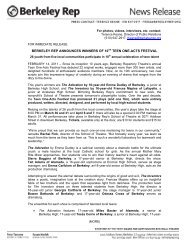ITAMAR MOSES'S TExTUAL ACROBATICS TAKE AIM AT THE ...
ITAMAR MOSES'S TExTUAL ACROBATICS TAKE AIM AT THE ...
ITAMAR MOSES'S TExTUAL ACROBATICS TAKE AIM AT THE ...
You also want an ePaper? Increase the reach of your titles
YUMPU automatically turns print PDFs into web optimized ePapers that Google loves.
let the<br />
Games beGIn<br />
Itamar moses’s<br />
textual acrobatIcs<br />
take aIm at the<br />
unsayable<br />
By MARk BlANkENsHIp<br />
for ages,<br />
but this year, Itamar Moses and the American theatre are<br />
finally going steady.<br />
Moses’s star began rising in earnest in the 2002–03<br />
season, when Florida Stage of Manalapan and Ithaca,<br />
N.Y.’s Hangar Theatre both produced his high-concept<br />
comedy-of-manners Bach at Leipzig and Portland Center<br />
Stage of Oregon premiered his Outrage, a philosophical<br />
drama that juggles historical eras. Constant productions<br />
and commissions have followed, keeping Moses’s name in<br />
the theatre press. He’s even had a taste of tabloid notoriety,<br />
since scandal-minded reporters insisted his subsequent<br />
play The Four of Us, about the vagaries of friendship, was<br />
a swipe at a famous friend.<br />
But that’s all prologue to this season, when the<br />
31-year-old writer boasts no fewer than five different<br />
plays—two of them brand new—on the production<br />
schedules of U.S. theatres.<br />
One of the debuts is Yellowjackets, a drama that charts the academic, economic and racial divides at Berkeley High School in<br />
California, where Moses himself was a student in the early ’90s. (Though a Berkeley native, he now lives in Brooklyn.) The play<br />
runs through Oct. 12 at Berkeley Repertory Theatre. Meanwhile, through Oct. 26, San Diego’s Old Globe is premiering Moses’s<br />
baseball-themed drama Back Back Back. A treatise on everything from steroid use in pro sports to the contradictions of American<br />
ideals, the play will also run this season at Manhattan Theatre Club (beginning Oct. 30) and Dallas Theater Center (this spring).<br />
And New York City’s Flea Theater offers a collection of Moses’s short plays, But You Will Get Used to It, in February ’09.<br />
Add his lengthening slate of upcoming projects—like a musical adaptation of Jonathan Lethem’s novel The Fortress of Solitude—and<br />
it’s clear this is Moses’s moment. “There’s a coming-of-age party on a national scale,” says Tony Taccone, artistic director<br />
of Berkeley Rep and an unabashed Moses admirer. “For Itamar, the transformation from ‘emerging writer’ to ‘established writer’<br />
is complete.”<br />
Of course, Moses’s ramped-up visibility didn’t just happen. It was borne on his writing, which has stimulated (and sometimes<br />
polarized) artists, audiences and critics across the country.<br />
If nothing else, you can count on an Itamar Moses play to be well constructed. “He has an incredible sense of dramatic<br />
architecture,” says Taccone, who helmed Yellowjackets. “It seems like many playwrights are driven by poetic or imagistic motors,<br />
and it’s rare for them to pay a lot of attention to plot these days. But Itamar does.”<br />
In a bit of professional foreshadowing, Moses applied to graduate schools with the 10-actor opus Outrage, which involves<br />
overlapping stories about Brecht, Socrates, Galileo and a contemporary college student. “Someone told me grad schools are more<br />
likely to forgive failures of craft in the face of ambition,” the writer recalls. “So I wrote the most outrageous play I could think<br />
of. Really, it’s a big mess.”<br />
36 AMERICAN<strong>THE</strong><strong>AT</strong>RE OCT08<br />
brennan cavanaugh
But as messy as it is, Outrage got Moses into New York University’s<br />
Tisch School of the Arts, where he earned his MFA in dramatic writing<br />
in 2002. Soon enough, he was refining his structural impulses and<br />
channeling them into intriguingly self-conscious dramatic forms.<br />
Bach at Leipzig, for example, which has played throughout the<br />
country, is rooted in a true story about 18th-century musicians,<br />
including Johann Sebastian Bach, competing for the organist’s job<br />
at Thomaskirche in Leipzig. Moses tweaks the facts so that every<br />
competing organist is named either Johann or Georg, and he models<br />
scenes after the musical structure of a fugue.<br />
Meanwhile, it initially seems like The Four of Us, which debuted<br />
at Manhattan Theatre Club this past spring under Pam MacKinnon’s<br />
From left, ariel Shafir, Jesse J. Perez and ebbe roe Smith in Celebrity Row at Oregon’s<br />
Portland center Stage in 2006.<br />
direction, is about two modern-day writer friends, David and Benjamin,<br />
whose relationship is strained after Benjamin publishes a successful<br />
novel. But in the final scenes, we realize we’ve been watching the<br />
play that David wrote about his friendship—and a coup de theatre even<br />
introduces two new actors so that David and Benjamin seem to be<br />
watching “David” and “Benjamin” from the wings.<br />
These plays have given their author a reputation for brainy<br />
antics. In his review of The Four of Us, Variety critic Sam Thielman<br />
called Moses “a structural acrobat” who “never met a meta-narrative<br />
he didn’t like.”<br />
But the “structural acrobat” label may not stick. Moses’s newer<br />
plays are inventive, but their formal conceits are far more subdued.<br />
Take Yellowjackets, which seems like straight-ahead realism, telling<br />
relatable stories about an ethnically diverse, socially tumultuous<br />
high school. Some audiences may not even notice that a few scenes<br />
repeat themselves.<br />
Early in the first act, for instance, a black teenager and his older<br />
brother discuss Berkeley’s musical legacy, which leads to a crack about<br />
Guns N’ Roses. A few scenes later, two white kids have essentially the<br />
same conversation, down to the Guns N’ Roses joke.<br />
<strong>THE</strong>RE’s A sIMIlAR p<strong>AT</strong>TERN IN Celebrity row, A<br />
fantasia whose conceit stems from character, not plot. In the play—<br />
which packed houses at Portland Center Stage in its 2006 premiere,<br />
under Chris Coleman’s direction, and runs Oct. 20–Nov. 9 at Chicago’s<br />
American Theater Company—notorious criminals like Timothy<br />
McVeigh, Ted Kaczynski and Ramzi Yousef.are housed at a supermaximum<br />
federal prison, where a well-meaning attorney accidentally<br />
facilitates havoc, amid some subtly coincidental occurrences: She<br />
tells a joke to the warden, only to have a prisoner tell it to her; she<br />
makes a snappy retort that’s echoed later in a wildly different context.<br />
These moments are like sly winks from the playwright, reminding<br />
us he has a master plan.<br />
Moses, whose dark stubble and slightly-tousled hair conjure<br />
the archetype of a young writer, says he’s been working on Celebrity<br />
Row for years, and the play has drastically changed. “In early drafts,<br />
there were all these sprawling back-story scenes, where we saw each<br />
brian vaughn in Bach at Leipzig at Milwaukee repertory<br />
Theater in 2005.<br />
of these criminals outside the prison with the people in their lives,”<br />
he says. “As I worked on it, I realized that the things I wanted to say<br />
about American domestic and foreign policy didn’t actually require<br />
scenes of, you know, Timothy McVeigh fighting in the Gulf War.<br />
Having him take on the role of the foot soldier among those guys in<br />
prison somehow says it much more elegantly.”<br />
But while he knows his writing is changing, Moses isn’t sure<br />
why. “From one perspective,” he says, “I may have been writing in<br />
that overt way because less had happened to me. I had fewer stories<br />
to tell, but I wanted to make the stakes high. So maybe I was looking<br />
for ways to make deeper connections happen through the element of<br />
craft. Maybe now I see how to do essentially the same thing in a way<br />
that’s less overt. It’s becoming clearer to me that the more you focus<br />
on something really small, the more it can stand in for something<br />
emotionally enormous or theatrically enormous.”<br />
That statement about his craft—thoughtful, frank and ambivalent—is<br />
like a microcosm of the message in Moses’s plays. For all<br />
their dramaturgical differences, almost all of them present a massive,<br />
perhaps unsolvable cultural problem and then examine it from<br />
multiple points of view.<br />
That’s what makes the twist in The Four of Us more than<br />
OCT08 AMERICAN<strong>THE</strong><strong>AT</strong>RE 37<br />
Owen carey<br />
Jay weSThauSer
a neat trick. The playwithin-a-play<br />
is a physical<br />
manifestation of conflicting<br />
emotions. On one hand,<br />
David is immature and jealous<br />
about Benjamin’s success;<br />
but on the other, David<br />
has been spurred on to write<br />
an honest and sensitive play<br />
about his feelings. As crippling<br />
as it is, his envy actually<br />
pushes him to his own<br />
greatest achievement. Moses<br />
asks us to acknowledge the<br />
positive and negative at the<br />
same time.<br />
“Any question that has<br />
an easily articulated answer<br />
Michael esper, left, and gideon banner in The Four of Us at Manhattan<br />
Theatre club this past spring.<br />
isn’t worth writing a play about,” Moses ventures. “If you land on<br />
an answer at the end of a play, it’s probably going to ring false.<br />
That’s not to say I go into a play without a point of view. But I<br />
never feel like the thing is done until I’ve given equally strong<br />
arguments to the sides I supposedly disagree with.”<br />
The response to Moses’s writing has been equally complex.<br />
When Bach at Leipzig was published, Tom Stoppard wrote<br />
the introduction, calling Moses a “new and original voice.”<br />
In addition to directors Taccone and Coleman, Moses’s other<br />
champions have included playwright Doug Wright and literary<br />
manager Megan Monaghan of California’s South Coast Repertory,<br />
who served as dramaturg for SCR’s 2006 production of Bach at<br />
Leipzig. “He comes in with something fundamental to say and<br />
then finds a compelling way to say it,” Monaghan avows. “It’s<br />
a rare combination of intellectual horsepower and grounded<br />
emotional content.”<br />
Yet the mental games Moses sometimes plays may have kept<br />
some theatres at bay. And critics—especially in New York—have been<br />
seriously divided about Moses’s approach. In the New York Times,<br />
Charles Isherwood called Bach at Leipzig “ardent but hollow.” In his<br />
review of The Four of Us, Time Out New York’s David Cote wrote, “If<br />
there’s a drawback to this writer’s ease with form...it’s an unwillingness<br />
to dig too deep.”<br />
Asked about his occasional drubbing, Moses reflects instead on<br />
the nature of journalistic criticism.<br />
“From one perspective, it’s something to be outraged about,” he<br />
reasons. “You know, ‘I worked on this thing for five years, and then<br />
he worked on his review for 24 hours, and that’s the verdict?’ But all<br />
the critic had was 24 hours—that’s the way it’s set up. So taking the<br />
extreme long view, it’s less of a problem: The aggregate critical response<br />
to something over years and decades tends to be accurate.”<br />
If ANyTHINg, MOsEs Is lEss dIsAppOINTEd By HIs<br />
reviews than by the hoopla that surrounded the New York premiere<br />
of The Four of Us. Vanity Fair, New York magazine and the popular<br />
website Gawker all speculated that the rivalry in the play was based<br />
on his friendship with the novelist Jonathan Safran Foer, who rose<br />
to fame with the best-seller Everything Is Illuminated.<br />
“It’s true Jonathan’s a friend of mine, so some of the things in<br />
the play are drawn from that,” Moses allows. “But it’s also true that I<br />
have dozens of friends who are writers, and I’ve been on both sides of<br />
that relationship many times. No matter what sort of autobiographi-<br />
“Any question<br />
thAt hAs<br />
An eAsily<br />
ArticulAted<br />
Answer<br />
isn’t worth<br />
writing A plAy<br />
About,“ moses<br />
ventures.<br />
cal spark you start from, you<br />
have to start deviating from<br />
the truth for the good of<br />
the play.”<br />
Besides, seeking Moses<br />
in his plays could be a fool’s<br />
mission—even his first-person<br />
writing can be elusive. In<br />
2005, he interviewed himself<br />
for the online magazine Salt,<br />
and the self-referential piece<br />
ends with Moses wrestling<br />
himself to the ground. In<br />
the afterword to The Four<br />
of Us, published earlier this<br />
year, he spends as much<br />
time imagining the private<br />
life of his editor as he does<br />
explaining his motivations<br />
for writing the play.<br />
But then, after 15 pages<br />
of joking around, Moses<br />
brings the afterword to a<br />
vulnerable place. “What a<br />
writer makes public,” he<br />
writes, “is at best a truthful<br />
but partial and fragmented<br />
glimpse of a private conversation<br />
that is happening all<br />
the time.” He goes on:<br />
But here’s the part I need for<br />
you to understand. I want to<br />
tell you absolutely everything<br />
about absolutely everything and that is why I do this and<br />
it never works. All I ever seem to do is tell you over and over<br />
and over again about the wanting. All I ever do is introduce the<br />
things I really want to say. Which are unsayable with words.<br />
Which are not pure bursts of feeling and sound, but which<br />
want to be, for you.<br />
Maybe this will be the dominant arc of Moses’s career—letting<br />
each play create a new collision of form and feeling, so that we can<br />
share in his struggle to say something true. Maybe every structural<br />
experiment and every political question will be another attempt to<br />
express something about our culture that’s almost impossible to<br />
communicate.<br />
For now, Moses seems content to keep experimenting. Asked<br />
if he has any “mountains to climb,” he thinks a moment and replies,<br />
“I’m just trying to keep challenging myself by saying things I haven’t<br />
said before. I’m trying to write each play like it’s my first play, to bring<br />
that humility to it. I think there’s a danger in believing the next play<br />
is going to begin automatically from some level of accomplishment<br />
because of the work you put into the last one.”<br />
He adds, “Maybe that’s the mountain I’m trying to climb—the<br />
awareness that I’m always at the bottom of the mountain.”<br />
New york–based critic Mark Blankenship is a 2006–07<br />
American theatre Affiliated Writer, supported by a grant from<br />
the Jerome foundation.<br />
38 AMERICAN<strong>THE</strong><strong>AT</strong>RE OCT08<br />
JOan MarcuS



